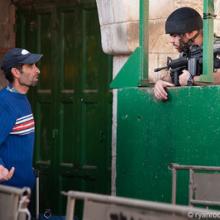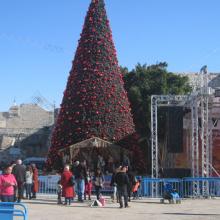West Bank
At a vigil for peace in Washington, D.C., this Tuesday, Palestinian Lutheran pastor Munther Isaac spoke about the approaching Christmas season in his home of Bethlehem in the West Bank.
“How can we celebrate when we feel this war — this genocide — that is taking place could resume at any moment?” he said.
The government of Israel could soon begin formally annexing a significant portion of the West Bank. As the leader of an ecumenical and nonpartisan organization focused on advocating for a just and lasting end to the conflict in Israel-Palestine, I am deeply worried annexation will entrench inequalities and abuses of Palestinian human rights.
THE DEATH of former Israeli Prime Minister Menachem Begin on March 9 brought back memories of high hopes for Middle East peace. ... Begin’s passing also recalled his determination to establish Israeli settlements on the West Bank’s Occupied Territories, areas he called by their biblical names—Judea and Samaria. The day after his election as prime minister in May 1977, Begin visited one of the handful of settlements then in existence, Elon Moreh, to declare: “There will be many, many settlements in the coming weeks.”
LIKE MUCH OF the world, I’ve been thinking quite a bit about ISIS over the past few months. I’ve been horrified by the accounts of the so-called Islamic State’s barbarism, and I lament their perversion of one of the world’s great religions.
Most of all, I’m outraged at their disregard for human life—at their wanton killing of Shia Muslims, Christians, Yazidis, and anyone else who doesn’t share their radical vision. Pope Francis has said that it’s legitimate to act to protect innocent lives in this case, and I don’t disagree with him.
Yet I believe that Jesus calls us to be peacemakers, which requires us to think beyond short-term military solutions and address the systemic issues that breed crises like this one. And I strongly believe that to have any moral authority in the current crisis, we must first confess the Western policies and attitudes that have contributed to where we find ourselves today—and then repent of those policies and attitudes.
The first thing we need to confess is a shallow and, at best, incomplete understanding of ISIS. Alireza Doostdar of the University of Chicago Divinity School wrote, “[We] seem to assume that ISIS ... has suddenly materialized out of the thin ether of an evil doctrine. But ISIS emerged from the fires of war, occupation, killing, torture, and disenfranchisement. It did not need to sell its doctrine to win recruits. It needed above all to prove itself effective against its foes.”

Ryan Rodrick Beiler / Shutterstock
My people have committed two sins: They have abandoned me, the spring of living waters, and have dug for themselves cisterns, broken cisterns ... that hold no water.
—Jeremiah 2:13
IN THE LATE 1980s and early '90s, Palestinians rose up against the Israeli occupation of Palestinian territories in what became known as the First Intifada. Instead of acceding to the demands for justice by the "children of the stones," the response was a process of talks that led to the signing of the Oslo Accords in 1993.
The “peace process” engaged the leadership of the PLO (Palestine Liberation Organization)—then weak, corrupt, exiled, and with little vision or support—in what turned out to be a worse-than-fruitless effort that led to the perpetuation of the occupation and suffering of the Palestinian people, and which made a just peace even further away.
The process was intriguing to many of us in the peace and justice community, and it successfully co-opted us, as it co-opted the Palestinian leadership, but this process entailed both the abandoning of principled positions and the adoption of the Oslo system, a broken system that could not possibly deliver what it promised.
We were treated to a new language by Israel and the U.S., which seemed at first blush to adopt our own slogans: Where Palestinians were constantly complaining of Israel’s refusal to acknowledge them—its demonization of their leadership, and trying to have Jordan or other local collaborators speak on their behalf—the new process brazenly invited the PLO itself and its leader Yasser Arafat to participate as the “sole legitimate representative of the Palestinian people.”
When the Word becomes flesh, when the Son of God becomes one who bleeds, Jesus demonstrates God's humble solidarity with human nature from Adam and Eve onward, to the last person born in history.
This vulnerability of God for us, this identification of Jesus with our collective human frailty, changes our perspective on everything. In the light that shines from the face of Jesus Christ, we at last see God and humanity with 20/20 vision.
Paul comes to this vision late in the day, well after the events of God in the flesh that reconcile the Father to God's creation. The vision of Jesus blinds him but when his eyes are healed, having seen Jesus, he sees God and humanity and the world very differently than he did before the vision of Christ that overwhelms him.
Years later, in a letter to the Corinthians, speaking about the church's worship with blest eyes he writes: "When we drink from the cup we ask God to bless, isn't that sharing in the blood of Christ? When we eat the bread we break, isn't that sharing in the body of Christ?"
This week’s “10 Best Stories” missed an important news item from Palestine — not about Pope Francis but rather a family that practices what the pope preaches.
Tent of Nations, in the Occupied West Bank, has become a sign of hope over the otherwise fruitless last decades of peace negotiations. Interlocutors have nibbled around the edges of a “two state solution” since the early 1990s with the result that Israel has been able to confiscate vast areas of Palestine. The Nassar family, represented by Daoud and his parents and siblings, have built on their 100 acres a veritable garden of peace. This luxuriant vineyard is 15 minutes from Manger Square, Bethlehem. It has been owned by the Nassars since Ottoman times, and “Tent” has illustrated, what is declared on a stone at its entrance – non-violent action in its most faithful form. More than 7,000 visitors from around the world along with children in summer camps, as well as both Israelis and Palestinians, have been buoyed by the Nassars' 100-year commitment to living peaceable amidst turmoil by expressing biblical principles of loving neighbors, forgiving those who oppress, and peaceful coexistence with their neighbors.
Early on May 19, military bulldozers destroyed 1,500 fruit trees nearly ready for harvest in the valley below the Nassar dwellings. There was no warning of the impending destruction of the trees and terraced land, left in a state of rubble with no hope of being replanted. Daoud said the family was awaiting word on an appeal submitted after military orders to stop cultivation; bulldozers came before a legal response.
It sounds a little far-fetched and for some purists perhaps unthinkable: A pope, a rabbi, and a sheik decide to travel to the Holy Land and follow in the steps of Jesus.
The Argentina-born pope will be accompanied by colleagues Rabbi Abraham Skorka and Sheik Omar Abboud, both from Buenos Aires. It is the first time a pope’s official delegation has included members of other faiths on an overseas trip.
In the run-up to the Super Bowl, advertisers work hard to get their money’s worth, even before their spot has run. They leak teasers and hype the stars who will appear in them. If they can find a way, they generate controversy.
This year, SodaStream is already the big winner in the controversy category. One of the dust-ups surrounds a tug of war between SodaStream and Oxfam International over Scarlett Johansson, who recently accepted a role with the carbonation company and will appear in its Super Bowl ad.
On Wednesday, Johansson resigned her eight-year-long goodwill ambassadorship with Oxfam, citing a "fundamental difference of opinion."
BETHLEHEM, West Bank — Two weeks before Christmas, one of the most powerful storms to hit the Middle East in a century dumped several inches of snow on the hills of Bethlehem.
In addition to shuttering schools and businesses, the storm caused runoff to trickle down the walls of the Church of the Nativity, built above the traditional birthplace of Jesus.
Fortunately, the water damage was relatively minor, church officials say, thanks to a rare cooperative venture already underway to repair the basilica’s roof, leaky windows and old wooden beams, some 1,500 years old.
“There were still leaks, but thanks to the scaffolding that was erected for the restoration work, the damage was controlled,” said the Rev. Pierbattista Pizzaballa, custodian of the Holy Land for the Roman Catholic Church.
In what some are calling the biggest miracle in Bethlehem since the birth of Jesus, the three churches that share responsibility for the Nativity church put aside centuries of tense relations this past year to ensure the job gets done.
As Israeli and Palestinian negotiators prepare for preliminary talks in Washington today, the future of Jerusalem — holy to three faiths — looms as the thorniest and most difficult issue to resolve.
The State Department announced Sunday that the two sides had accepted invitations from Secretary of State John Kerry to come to Washington “to formally resume direct final status negotiations.” The department said two days of initial meetings will begin this evening.
The announcement came shortly after Israeli Prime Minister Benjamin Netanyahu’s Cabinet approved the release of 104 Palestinian prisoners, a key part of the Kerry-brokered deal.

A Palestinian man is questioned at an Israeli military checkpoint in the West Bank. By Ryan Roderick Beiler http://bit.ly/sf1Pgt
A change is taking place in how evangelicals are looking at the Middle East.
Many evangelicals, who were discouraged by the failed prophecies and the “mood of doom” that dominated the evangelical church in the second half of the 20th century, are rediscovering that the gospel also speaks powerfully to issues of peace, justice, and reconciliation.
Books about the end times, such as those written by Tim LaHaye and Hal Lindsey, no longer dominate the bookshops, and people are being challenged by writings that focuses on the here and now, instead of the there and then!
In particular, the evangelical church typically has looked at the Middle East through the eyes of prophecy, leaning towards an unconditional support for Israel. Evangelicals in the West cheered the creation of the State of Israel in 1948 and the subsequent wars, believing them to be signs of the second coming of Christ—all the while neglecting the impact these events had on real people in the Middle East, specifically on Palestinians, and especially on the Palestinian Church.
The irony for Palestinian Christians is that evangelicals, with their over-emphasis on prophecy, have lost the capacity of being prophetic!
 An account in The New York Times by Ethan Bronner reports that Israeli women and West Bank Palestinian women and girls have once again broken Israeli laws. They have gone swimming in the Mediterranean Sea.
An account in The New York Times by Ethan Bronner reports that Israeli women and West Bank Palestinian women and girls have once again broken Israeli laws. They have gone swimming in the Mediterranean Sea.
More than two dozen Israeli women invited Palestinian women and girls from the southern part of the West Bank of the Jordan River -- who are not normally allowed into Israel and have no access to the sea -- to go swimming with them. Under Israeli military occupation since 1967, according to Bronner, "most had never seen the sea before."
The scenes were stunning: Hundreds of demonstrators pouring across the fence between Syria and the Israeli occupied Golan Heights.









